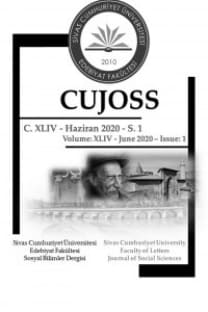AMERİKAN SOSYAL BİLİMİ VE DEVLETLE İLİŞKİSİ
Bu çalışma, Amerikan sosyolojisinin/sosyal biliminin devletle olan ilişkisine odaklanmıştır. 1960’lara kadar Amerikan sosyal biliminin dönemin koşullarına nasıl bir cevap verdiği önem arz etmektedir. Zira, toplumsal problemlere çözüm bulma misyonu yüklenen sosyal bilimler ve sosyolojinin alanla ilişkisi yoğun bir gündemle karşı karşıya kalmıştır. Bir yandan iki dünya savaşı ve ekonomik kriz diğer tarafta ise Soğuk Savaş’ın neden olduğu egemenlik mücadelesi sosyolojinin de bu duruma müdahil olmasına neden oldu. Amerika ve Sovyetler arasındaki soğuk savaşta dünya egemenlik alanlarının belirlenmesi ve genişletilmesi isteği askeri alanın dışında bilimin de önemini ortaya koymuştur. Bu çerçevede, çalışmamızda Amerika’da sosyolojinin devlet ve vakıf fonlarıyla ilişkisine değinilecek ve Truva ve Camelot Projeleri irdelenecektir.
Anahtar Kelimeler:
Sosyoloji, Truva Projesi, Camelot Projesi, Fon, Devlet.
This study focuses on the relationship between American social science/sociology and the state in America. It is important that how American social sciences gave a respond to the conditions of the period till 1960’s. Yet, social sciences and sociology that undertake finding solutions to the social problems have faced with busy agenda. On the one hand, two world wars and economic crisis and the other hand Cold War caused to hegemony struggle leaded sociology to get involved in this struggle. In the Cold War between America and Soviet, desire of determination and enlargement of world hegemony areas have revealed the importance of social science/sociology besides military. In this context, we will focus on the relationship between American Sociology and state-foundation funds and try to understand Truva and Camelot Projects
___
BAUMAN Zygmunt (1996), Yasa Koyucular ile Yorumcular, (Çev. Kemal Ata- kay), Metis Yayınları, İstanbul.CAMIC Charles (2007), “On Edge: Sociology During the Great Depression and the New Deal”, Sociology in America: A History, (in), (Edt. by. Craig Calhoun), The University of Chicago Press, Chicago, pp. 225-280.
CONVERSE, J. M. (1987), Survey Research in the United States: Roots and Emergence 1890-1960, University of California Press, Berkeley.
ENGERMAN, David C. (2012), “Social Science in the Cold War”, Isis, Vol. 101, No. 2, pp. 393-400.
FOUCAULT Michel (2006), Deliliğin Tarihi, (Çev. Mehmet Ali Kılıçbay), İmge Kitabevi, Ankara.
FOUCAULT Michel (2007), İktidarın Gözü: Seçme Yazılar, (Çev. Işık Ergüden), Ayrıntı Yayınları, İstanbul.
HERMAN, Ellen (2000), “Camelot Projesi ve Soğuk Savaş Döneminde Psikolo- jinin Macerası”, Üniversiteler ve Amerikan İmparatorluğu: Savaş Döne- minde Sosyal Bilimlerde Para ve Siyaset, (iç.), Edt. Christopher Simpson, Çev. Musa Ceylan, Kızılelma Yayıncılık, İstanbul, s. 117-146.
HOROWITZ, Irving Louis (1994), The Decomposition of Sociology, Oxford University Press, New York
HOROWITZ, Irving Louis and KATZ, James Everett (1975), Social Science and Public Policy in the United States, Praeger Publishers, New York.
LYONS, Gene M. (1969), The Uneasy Partnership: Social Science and the Fede- ral Government in the Twentieth Century, Russel Sage Foundation, New York.
NEEDELL, Allan A. (2000), “Truva Projesi ve Sosyal Bilimlerin Soğuk Savaş Tarafından İlhakı”, (iç.), Üniversiteler ve Amerikan İmparatorluğu: Savaş Döneminde Sosyal Bilimlerde Para ve Siyaset, (Edt. Christopher Simp- son, Çev. Musa Ceylan), Kızılelma Yayıncılık, İstanbul, s. 41-69.
NICHOLS, Rodney W. (1993), “Federal Science Policy and Universities: Con- sequences of Success”, Deadalus, Vol. 122, No. 4, pp. 197-224.
PLATT, Jennifer (1996), A History of Sociological Research Methods in Ameri- ca: 1920-1960, Cambridge University Press, New York.
Recent Social Trends in the United States, Report of the President’s Research Committe on Social Trends, 2 Volumes. (1933), McGraw Hill Book Co., New York.
RHOADES, L. J. (1981), A History of the American Sociological Association: 1905-1980, American Sociological Association Press, Washington.
SOLOVEY Mark (2001), “Project Camelot and the 1960s Epistemological Revo- lution: Rethinking the Politics–Patronage–Social Science Nexus”, Social Studies of Science, Special Issue: Science in the Cold War, Vol. 31, No, 2, pp. 171-206.
TURNER, Stephen P. and TURNER, Jonathan H. (1990), The Impossible Science: An Institutional Analysis of American Sociology, Sage Publications, Cali- fornia.
WAGNER Peter (2001), A History and Theory of the Social Sciences, Sage Pub- lication, London.
WATERS, Lindsey (2009), Akademinin Düşmanları, (Çev. Müge Özbek), Boğa- ziçi Üniversitesi Yayınevi, İstanbul.
- ISSN: 1305-5143
- Yayın Aralığı: Yılda 2 Sayı
- Yayıncı: Sivas Cumhuriyet Üniversitesi Edebiyat Fakültesi
Sayıdaki Diğer Makaleler
SINIF ÖĞRETMENLERİNİN HİZMET İÇİ EĞİTİMDE EYLEM ARAŞTIRMASINA İLİŞKİN GÖRÜŞLERİ
David Copperfield’de Karmaşık Efendi-Hizmetkâr İlişkileri: Sınıf Bilinci
ZEYTİNLİ ADA (ERDEK-BALIKESİR) TOPLULUĞUNDAN ERKEN BİZANS DÖNEMİ’NE AİT BİR SİFİLİS (FRENGİ) ÖRNEĞİ
Fadime SUATA ALPASLAN, M. Sabri BEKMEZ
ARGUVAN ÖRNEKLEMİNDE “DEDE SAZI”NIN ORGANOLOJİSİ VE İCRA ÖZELLİKLERİ
Sinan HAŞHAŞ, Ünal İMİK, Can AYDOĞDU
HÂFIZ OSMAN EFENDİ’NİN FERÂİZ LÜGAZLARI
GÜVENLİK VE EKONOMİK BOYUTUYLA NÜKLEER ENERJİ TARTIŞMALARI: AKKUYU NÜKLEER SANTRALİ ÖRNEĞİ
AMERİKAN SOSYAL BİLİMİ VE DEVLETLE İLİŞKİSİ
Aldous Huxley’nin Ses Sese Karşı Adlı Romanında Metinlerarası Bağlantılar
TÜRK ROMANINDA NÜFUS MÜBADELESİ VE BİR MÜBADELE ROMANI OLARAK MOR KAFTANLI SELANİK
